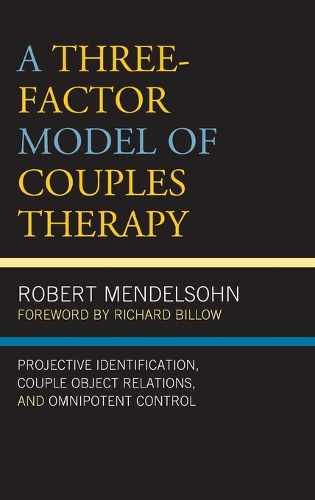
A Three-Factor Model of Couples Therapy: Projective Identification, Couple Object Relations, and Omnipotent Control
(Hardback)
Publishing Details
A Three-Factor Model of Couples Therapy: Projective Identification, Couple Object Relations, and Omnipotent Control
By (Author) Robert Mendelsohn
Foreword by Richard Billow
Bloomsbury Publishing PLC
Lexington Books
7th August 2017
United States
Classifications
Professional and Scholarly
Non Fiction
Psychotherapy: counselling
Psychotherapy
616.891562
Physical Properties
Hardback
284
Width 157mm, Height 240mm, Spine 27mm
608g
Description
Couple psychotherapy extends the work of the psychotherapist to the patients most significant committed adult relationship, yet the therapy is difficult both conceptually and technically. One major reason for this difficulty is that in every couples treatment there is a confusing array of psychological defenses as well as regressive and nonregressive couple object relations-as distinct from the object relations that each individual member brings to the couple. Further, many of these processes are occurring outside consciousness and at the very same time. This book is an attempt to clarify all the confusing issues by presenting a three-factor model of couple psychotherapy within a psychodynamic framework. This model has been found to be very effective with many different kinds of couples. The book suggests that there are three powerful couple dynamics that shape every couples treatment: (A) the quality and quantity of the couples projective identifications; (B) the level of their couple object relations; and (C) the presence or absence of the defense of omnipotent control. These three variables are the most important factors in the therapy; they determine the success or failure of every therapy with every couple. These dynamics also determine quite a bit about how to conduct a couple therapy with regard to the therapists level of activity, tone, the way of sorting the material in his or her head, and even the kinds of interventions he/she chooses (whether or not, for example, the therapist will use certain resistance techniques). Understanding these three variables and how they interact is key to the success of the therapy.
Reviews
A Couples Therapist is destined for 'dj vu,' a career of groundhog days. Dr. Mendelsohn shares the phenomenology of his discovery processas he understands how he comes to be (by necessity) a major player in the couples parasitic, symbiotic, narcissistic, sibling, or Oedipal dramas. The journey makes for compelling reading, and is inspirational. Mendelsohns style his inimitable, it's his and his alone. But the concepts and techniques he offers are adaptable; they may free up the thinking and practice of a contemporary couples therapist, no matter his or her orientation. -- Richard Billow, Adelphi University
Bob Mendelsohn hasadvanced the practice of couple psychoanalysis byintegrating his marvelous and unique three-factor model with Kleinian/Bionion object relations ideas about unconscious projective processes.Hemakes themodelaccessible to the reader with evocative case material.This bookshould be in every couple therapist's library regardless of levels of experience. -- Carl Bagnini, LCSW, BCD, The International Psychotherapy Institute; Author of Keeping Couples in Treatment: Working from Surface to Depth
Author Bio
Robert Mendelsohn is professor of psychology at the Derner School of Psychology, Adelphi University.
